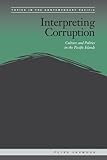Interpreting Corruption : Culture and Politics in the Pacific Islands / Peter Larmour.
Material type: TextSeries: Topics in the Contemporary PacificPublisher: Honolulu : University of Hawaii Press, [2012]Copyright date: ©2012Description: 1 online resource (208 p.)Content type:
TextSeries: Topics in the Contemporary PacificPublisher: Honolulu : University of Hawaii Press, [2012]Copyright date: ©2012Description: 1 online resource (208 p.)Content type: - 9780824835149
- 9780824861193
- 364.1/3230995 23
- JQ5995 .L38 2012
- online - DeGruyter
- Issued also in print.
| Item type | Current library | Call number | URL | Status | Notes | Barcode | |
|---|---|---|---|---|---|---|---|
 eBook
eBook
|
Biblioteca "Angelicum" Pont. Univ. S.Tommaso d'Aquino Nuvola online | online - DeGruyter (Browse shelf(Opens below)) | Online access | Not for loan (Accesso limitato) | Accesso per gli utenti autorizzati / Access for authorized users | (dgr)9780824861193 |
Frontmatter -- Contents -- From the General Editor -- Acknowledgments -- Acronyms -- 1. Introduction -- 2. Talk and Silence about Corruption -- 3. What Counts as 'Corruption'? -- 4. Explaining Corruption -- 5. How Much Corruption Is There? -- 6. Seven Types of Corruption -- 7. Culture and Corruption -- 8. Politics and Corruption -- 9. Conclusions -- References -- Index -- About the Author
restricted access online access with authorization star
http://purl.org/coar/access_right/c_16ec
Corruption is a popular topic in the Pacific Islands. Politicians are accused of it and campaign against it. Fiji's coup leaders vowed to clean it up. Several countries have "leadership codes" designed to reduce corruption, and others have created specialized anti-corruption agencies. Donors, the World Bank, and NGOs such as Transparency International have made it an international issue. Yet there is often disagreement about what constitutes corruption and how seriously it matters. What some view as corrupt may be regarded as harmless by others. Existing laws have proved difficult to enforce and seem out of step with public opinion, which is often very suspicious of corrupt behavior among island elites. As well as talk there is silence: People fear the consequences of complaining. The dangers of anti-corruption campaigns became apparent during the "cleanup" following Fiji's 2006 coup.So what counts as corruption in the Pacific and what causes it? How much is really going on? How can we measure it? What types are present? Are gifts really bribes? Is "culture" an excuse for corruption? Is politics-in particular, democracy-intrinsically corrupt? In clear and concise language, this work attempts to answer these questions. The author takes a comparative approach, drawing on economics, law, political science, and anthropology, as well as literature and poetry from the region. He looks at Transparency International's studies of National Integrity Systems and at newer research, including events since the Fiji coup.Interpreting Corruption is a highly accessible and approachable look at an age-old problem. Those interested in the Pacific Islands and public integrity will find it remarkably comprehensive as will students and scholars of anthropology, sociology, and political studies.
Issued also in print.
Mode of access: Internet via World Wide Web.
In English.
Description based on online resource; title from PDF title page (publisher's Web site, viewed 02. Mrz 2022)


